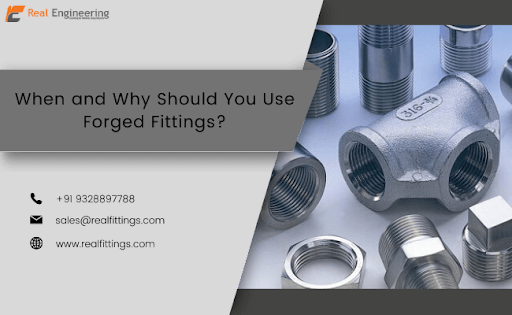Forged fittings suppliers are being used to connect vents, pipes, pumps, and other hardware to start creating piping systems with diameters of 2 or 4 inches.
Forged fittings are classified into two types: socket-weld fittings and looped fittings. Fillet welds attach socket-weld fasteners to pipes, so pierced fasteners are screwed onto the piping system.
It is made of solid steel blocks that are ground to the final required shape within the implementation of the changes by the specified standards. The forged fittings suppliers category indicates the maximum permitted pressure that the unit could indeed withstand.
Why Should You Use Forged Fittings?
High-quality high-pressure forged fittings are made from the best raw materials and can be used in a spectrum of uses. Forged fittings are completed with exceptional continuity and dependability to ensure long life, high pressure, and quality control.
High-Pressure Fittings are being used in nearly all manufacturing programs that demand intricately machined interconnection. It is also used to test hydro structures.
Chemical fertilizer industries, measuring instruments, nuclear thermoelectric industries, exchangers, oil gas industries, pharmacist surgical industries, moisture propane systems, as well as oil refining chemical products all use these fasteners.
High Pressure Forged Fittings have been used in a variety of applications with high-temperature increases. It is used to means of air fluids or gases from one location to another.
For this real estate, it is commonly used in several chemicals as well as gas manufacturing sectors. It has excellent welding and tries to form properties such as strength temperatures, making it ideal used in many operational processes requiring 500 degrees Celsius.
Making pharmacological equipment, as well as vessels and oil refinery hardware, is another industry that can be used.
Other industries in which these Forged fittings suppliers are used include medicine manufacturing vessels, hardware, oil refinery machinery, and so on.
Various tests are performed to make sure the availability of high products. The raw material exam, radiation therapy test, third-party home inspection, and so on are examples. We can provide documentary evidence such as high-temperature maps, pest management certificates, and so on.
Forged high-pressure fittings come in a multitude of configurations, including tees, elbows, crosses, nipples, and so on.
Titanium fittings are an excellent choice, but they are more expensive than forged steel fittings, which can simply drive construction costs up. Forged steel provides:
• A significant degree of endurance
• Free social ties leak
• The expense
You can achieve the high long-lasting durability that your piping systems require without spending a lot of money. Nobody needs to tell the visitor how the importance of keeping content costs as low as possible. While either one or two titanium pipe fittings will not make financial sense, when one’s project contains a large number of fittings, the cost quickly adds up.
Forged fittings are available in a variety of sizes and are designed for industrial use. They are accessible in both socket weld and threaded configurations. You have no trouble finding expense pipe network parts if you work with the correct source.
Ideal Solutions
Lynco carries whatever you need for installation and configuration, maintaining, repairing, as well as modifying pipes, including forged steel piping systems, branch interconnection, couplets, elbolets, and lengthy weld shoulder flanges.
Lynco is a dependable industrial pipeline material tool that provides unrivaled customer experience, elevated, dependable parts, and equipment. We make sure users have had the components you need to maintain your piping system running smoothly.
Forged steel fittings are carbon fiber pipe devices that have been forged. Forging steel produces extremely strong fittings. The carbon process involves heating to magma temperature changes before being placed in dies. After that, the heat source steel is manufactured into the forged steel fittings.
Forged high-strength devices are relatively durable and resistant to environmental factors. These pipes and fittings provide an excellent seal in one’s pipe networks, reducing the risk of leakages. Forged steel fittings provide a 37% increase in load capacity.
A cast fitting is created by pouring molten into a shape-specific mold. Because the grain stream of the thick metal piece is modified to comply with the contour of the portion in the die, forged steel fittings are greater and more dependable than castings. As a result, forging ensures that the finished part’s exact composition is consistent.
The fine-tuning is caused by the thermal loop and deformation procedure, which helps strengthen the final chapter in terms of internal operating pressure, responsible for the project, and shear.
Wear/wash laboratory tests on such a blank HRC 38-42 forged grinder insert is similar to testing on a high-strength HRC 46-50 cast blender insert; even so, an HRC 46-50 material lacks the elastic properties to manage high-impact grinding.
This checking demonstrates that forged steel fittings are more resistant to effects, pressures, and dress-up than casted fasteners. In brief, forged steel fittings outlast castings and are generally cheaper in application areas.
Also Read:
Know about Stainless Steel Polish Round Bars
